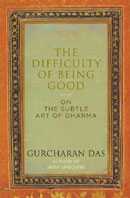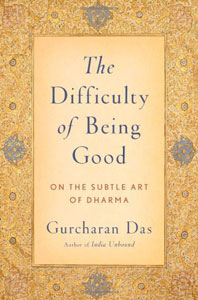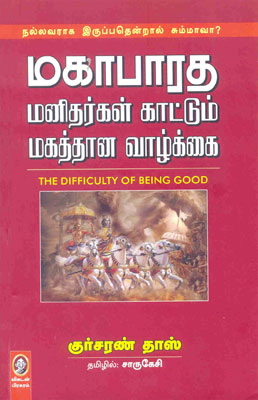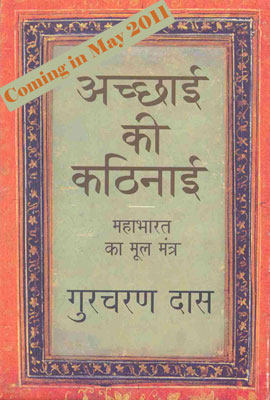- Biography
- Books
- Commentary
- Newspapers
- Asian Age
- Bloomberg Quint
- Business Line
- Business Standard
- Dainik Bhaskar (Hindi)
- Divya Gujarati
- Dainik Jagran (Hindi)
- Divya Marathi
- Divya Bhaskar
- Economic Times
- Eenadu (Telugu)
- Financial Times
- Hindustan Times
- livemint
- Lokmat, Marathi
- New York Times
- Prajavani (Kannada)
- Tamil Hindu
- The Hindu
- The Indian EXPRESS
- Times of India
- Tribune
- Wall Street Journal
- Essays
- Interviews
- Magazines
- Essays
- Scroll.in
- Newspapers
- Speaking
- Videos
- Reviews
- Contact
The Difficulty of Being Good
On The Subtle Art of Dharma
 |
 |
| ISBN: 9780670083497 Publisher: Penguin Books India |
ISBN: 9780199754410 Publisher: Oxford University Press, New York |
Most of us spend our lives wrestling with day-to-day questions of right and wrong and these either unanswered or have no easy answer. This book turns to the Sanskrit epic, Mahabharata, in order to answer the question, ‘why be good?’ and it discovers that the epic’s world of moral haziness and uncertainty is closer to our experience as ordinary human beings rather than the narrow and rigid positions that define most debate and discussion today after 9/11.
The Mahabharata is obsessed with the elusive notion of dharma—in essence, doing the right thing. When a hero does something wrong in a Greek epic, he gets on with it; when a hero falters in the Mahabharata, the action stops and everyone weighs in with a different and contradictory take on dharma. The epic’s characters are flawed; they stumble. But their incoherent experiences throw light on our day to day emotions of envy, revenge, remorse, status anxiety, compassion, courage, duty and other moral qualities. As the Mahabharata’s story unfolds in each chapter (and the author lets the epic speak as far as possible), the focus moves to a single character and his or her ethical problem–and its significance for our lives.
 |
 |
| Tamil Edition ISBN: 9788184763010 |
Hindi Edition Scheduled to be published in August 2011 |
The classical Indian life has four aims. Gurcharan Das’ earlier book, India Unbound, examined the aim of artha, material well being. This one dwells on the goal of dharma, moral well being. It addresses the central problem of how to live our lives in an examined way–holding a mirror to us and forcing us to confront the many ways in which we deceive ourselves; how we are false to others; and how we oppress fellow human beings. Its premise is that ordinary human life does not have to be so cruel and humiliating.
The author studied moral philosophy with John Rawls and Sanskrit with Daniel Ingalls at Harvard.
Read book reviews:
- William Dalrymple, Author
- Lord Meghnad Desai, Author, Columnist, Economist
- Sanjay Baru, Editor
- Arshia Sattar, Scholar
- Ananya Vajpayee, Scholar
- A.K.Bhattacharya
- N. Chandra Mohan
Read opinion of experts:
- Amartya Sen
- Martha Naussbaum
- Wendy Doniger
- Sheldon Pollock
- David Shulman
- Pratap Bhanu Mehta
- Sudhir Kakar
- Fareed Zakaria
- Thomas L Friedman
- Narayana Murthy
- Patrick Olivelle
- Nandan Nilekani
- Rajat Kanta Ray
- Richard Laraviere
- Ian Proudfoot
- Matthew Kapstein
- Chakravarti Ram-Prasad
- Andre Beteille
Listen to conversations on the book
- Nandan Nilekani and the author
- Ashis Nandy and the author
- Jerry Rao and the author
- Arun Maira and the author
- Salman Khurshid and the author
- Kiran Karnik and the author
Read excerpts from the book:
Read articles related to this book:
- The Dharma of Capitalism, The Wall Street Journal, APRIL 21, 2009
- Young India, old politicians, The Times of India, 12 April 2009
- Capitalist morals, The Times of India, 15 July 2007
- The difficulty of being good, The Times of India, July 30, 2006
- Draupadi's Question, The Times of India, Nov 28, 2004
Read foreword by author to:
Buy this book:
- from Penguin India
- from India Plaza
- from Flip Kart

